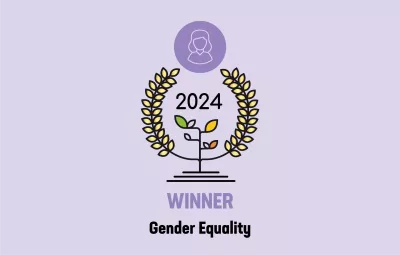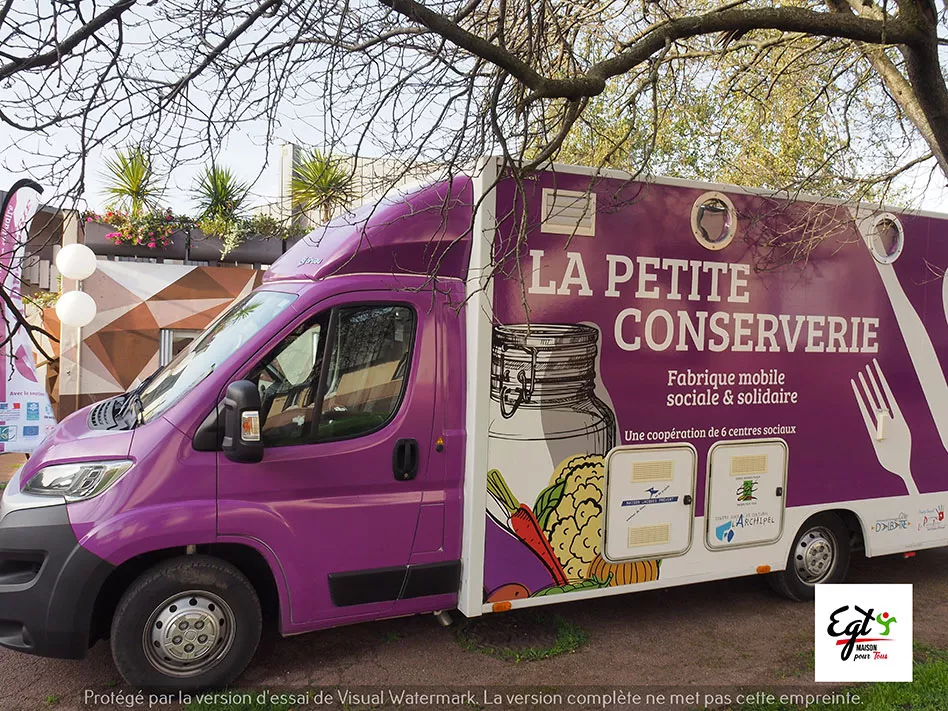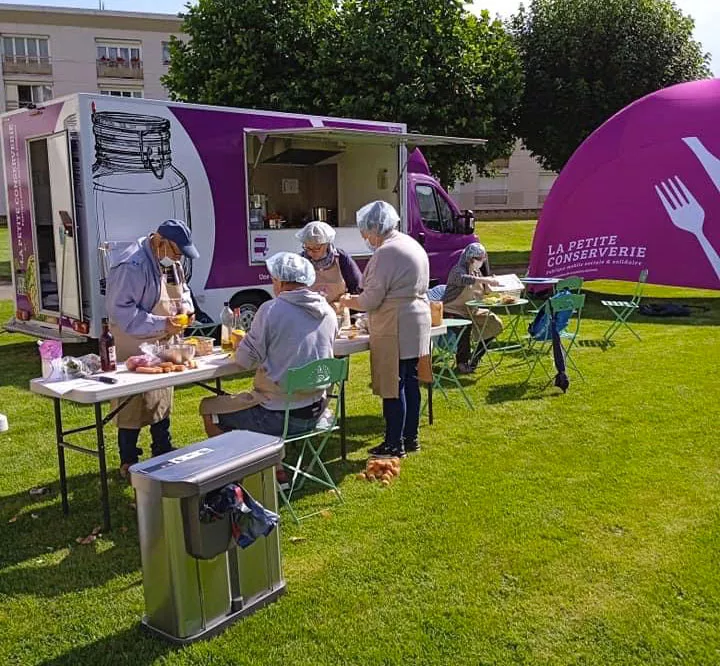General information
RDP Priority
- P6. Social inclusion and local development
RDP Focus Area
- 6B: Local development
RDP Measure
- M19: LEADER/CLLD
Beneficiary type
- Non-governmental organisation
Summary
The little conserve factory (La petite conserverie in French) is an innovative and cooperative project located in the northeast of Normandy which consists of collecting agricultural surpluses and transforming them into preserves, with the active involvement of local people. The vegetable conserves are then distributed to the inhabitants.
A truck with all the necessary equipment travels several times a week around neighbourhoods of the small city of Dieppe and the surrounding rural areas. Social centres collect vegetables and other ingredients from various partners and volunteers. The truck is then parked in a public space to offer workshops for cooking and making conserves, and eating on-site.
This mobile, social and solidarity-focused factory aims to reduce food waste and promote social cohesion between rural and urban areas, addressing social isolation and food insecurity while facilitating access to healthy, local food.
This project has provided the local population with access to a new service in this area and strengthened social cohesion in the territory. It has also helped highlight participants' know-how (in terms of techniques and recipes) and develop their soft skills (such as group dynamics, interpersonal skills, assertiveness, motivational and communication skills, and self-confidence).
Results
840 participants including 336 single individuals :
- 656 women, 184 men
- Rural area: 327, city of Dieppe area: 512 (of whom 399 from disadvantaged neighbourhoods)
- 295 unemployed, 327 employed, 218 retired
20 partners involved.
18 people associated with project design:
- Six in management activities
- Seven in facilitation activities
- Five volunteers
357 families able to increase their autonomy and food security.
Six social centres increased their activity by 13%.
Direct and active involvement of participants in a collective, cooperative and innovative action .
Increase in the number of beneficiaries actively participating in various social centres’ activities.
Better eating habits – shift in perception of vegetables and fruits in the diet.
Contribution to reducing food waste.
Knowledge-sharing.
Bringing social actions closer to rural territories thanks to the mobile truck, reduction in social isolation among populations.

Promoter
Maison Jacques Prévert
Funding
Total budget: EUR 51 316
EAFRD: EUR 29 784
National/Regional: EUR 14 892
Private/Own funds: EUR 6 640
Context
The tiny conserve factory operates in a complex context where food insecurity is combined with social isolation, particularly in rural areas. In 2015, about eight million people in France were facing food insecurity, of whom 4.8 million received food aid, including a third of all children under 15. The French National Food Council defines food insecurity as a lack of access to safe, nutritious and sufficient food, and it is an issue which poses a major challenge for French society.

At the same time, social isolation is also increasing in rural areas, exacerbated by mobility difficulties and an ageing population. The rising median age in these regions intensifies the issue, creating a vicious cycle of exclusion and precariousness.
This project thus addresses multiple issues, including access to quality food for those in need, reduction of food waste and strengthening of the social fabric in rural areas. Through the direct involvement of local people in the transformation and distribution process, the tiny conserve factory strongly promotes autonomy and solidarity within rural communities.
Objectives
This mobile project with a focus on solidarity addresses multiple social and environmental issues while fostering community engagement and sustainable practices. La petite conserverie primarily aims to combat food insecurity, fight against food waste and promote healthy and local food.
The added benefits include facilitating social connections among local people, restoring the lost art of certain cooking and food preservation methods, discovering and using environmentally friendly gardening techniques and developing participants' skills, which are then recognised with badges.
The project as a whole aims to rebuild connections between farmers and local inhabitants and support volunteer engagement.
Activities

One of the main activities of the project was workshops for families, local inhabitants and communities. This involved training in the techniques of conserve-making and workshops for specific audiences such as people with disabilities, people involved in job insertion programmes and dietitians.
It was also important to present the conserve factory project with partners to the local community at the public library, specialised institutions, seniors’ residences, the food bank and the solidarity grocery store. This was also done by participating in various public events, including social and solidarity days and various festivals in the city of Dieppe and the surrounding region.
As such, the project can be considered an excellent example of networking, as it fostered collaboration among partners from diverse social and professional backgrounds who might not have interacted otherwise. It has created a virtuous cycle, connecting farmers, local grocery stores, local communities, social centres and facilitators throughout its production timeline. Farmers and market gardeners donated their surplus to social centres, which then passed it on to the truck facilitators. Food is also collected during solidarity gleanings (in case of overproduction) and donations include vegetables or fruit that are 'not beautiful', too ripe or can no longer be sold.
The facilitators used the crops to cook food in glass jars while demonstrating preservation techniques to local people. Additionally, volunteer farmers were involved in the project to showcase various farming and gardening techniques.
To achieve this, the project holders had to reach out to various stakeholders. They set up non-commercial partnership with farmers, solidarity partnerships with grocery stores, got involved in activities with social organisations and worked on communications with financial partners and also the CAF 76 (family social allowance) organisation and the local Federation of Social Centres to highlight food-related actions carried out by social centres in this area.
Main results
In concrete terms regarding the issue of those in need, 357 families were able to increase their autonomy and food security, while six social centres increased their activity by 13% thanks to the project. 78% of the project beneficiaries were women, many of them socially isolated and/or single mothers, from disadvantaged neighbourhoods and rural areas.
In social terms, the project helped to maintain social connections by providing people in precarious situations with access to healthy and environmentally friendly food, taking a dynamic approach to maintaining and developing social bonds. It also increased the number of beneficiaries actively participating in various social centres’ activities.
More generally, it brought about a shift in perception of the use of vegetables and fruits in people’s diets and contributed to reducing food waste through harvests with volunteers, fostering better eating habits and enhanced gardening practices among local people. It also improved the local social fabric via the workshops and helped overcome accessibility barriers for people in rural areas by the very nature of the project and its focus on mobility.
Eighteen people were associated with the project design: six in management activities, seven in facilitation activities and five volunteers. Twenty different partners were also involved in the project on a variety of levels. Many women were part of the project team and all benefited from learning workshop facilitation skills, logistics, relationships with other organisations and partners, communication activities, project promotion and involvement in festivals and events.
Key lessons
The project led to a successful, very rich and diverse cooperation among a real diversity of partners on the local territory, encompassing both rural and urban areas, shops and farmers, local communities and social centres.
The project holders also have a beautiful truck, a high-quality and efficient tool that serves multiple purposes. They are proud of having this unique truck in their region, both as a vehicle and as a means of hosting workshops with local people and farmers.
On a different level, the project has been able to highlight hidden social skills and abilities, enhancing the participants’ self-esteem through social interactions.
Grégory CELO

